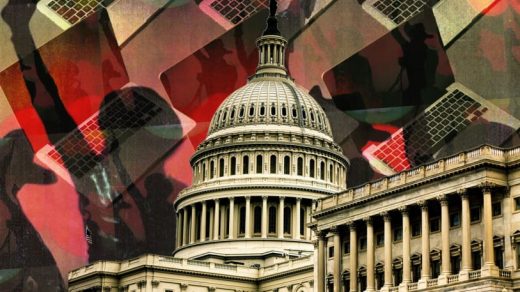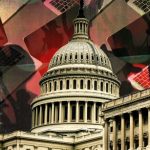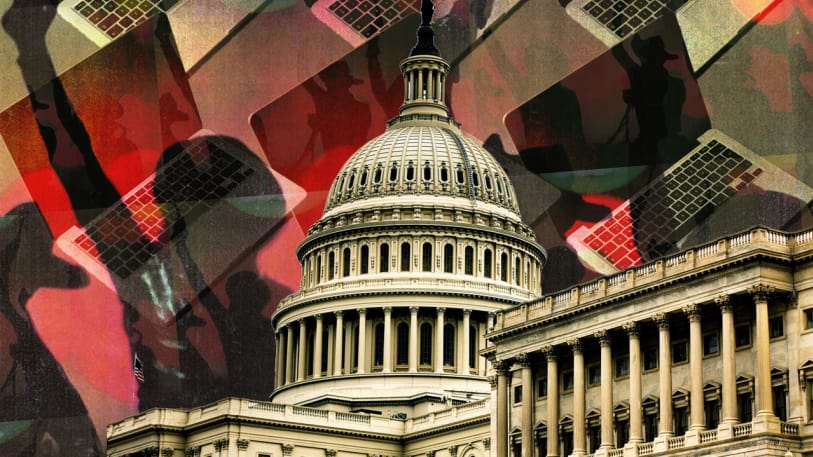No, Really: Congress Is About To Hand Over Your Personal Browsing Data To Advertisers
We tend to think of the internet as constantly moving forward, but it’s likely to take a huge step backward very soon—at least as far as your privacy rights are concerned. The Senate is getting ready to vote on a GOP resolution that would invalidate recently adopted FCC rules that let consumers decide how their data is shared by internet providers. The move would essentially give ISP giants like Comcast and Verizon free rein to collect and sell sensitive data about you without giving you a chance to say no.
The resolution was introduced by Republican Senator Jeff Flake of Arizona early last week, and was signed by 23 cosponsors, not a single Democrat among them. Senate majority leader Mitch McConnell has since signed on, adding to its momentum in the Senate. Politico reports that McConnell may push the matter to a vote as early as next week. Meanwhile, Rep. Marsha Blackburn of Tennessee is warming up a companion bill in the House.
Congressional sources tell Fast Company that the resolution has an excellent chance of passage in the GOP-controlled Congress. It relies on a rarely used law called the Congressional Review Act (CRA), which was passed in 1996 to help Congress quickly wipe away “unnecessary regulation.” Using the CRA, the resolution needs only a simple majority for passage in the Senate and the House. Defeating the resolution would require some GOP defections in both houses.
The broadband privacy rules were originally introduced under Obama with the FCC’s 2015 Open Internet Order, championed by then-chairman Tom Wheeler, and were approved in October 2106. The new Trump-appointed chairman, Ajit Pai, is a longtime opponent of broadband privacy rules and has long favored removing them. In fact, Pai already placed on hold the part of the 2015 ruling requiring that ISPs put in place certain security protections to prevent user browsing data from being stolen by hackers.
Pai has said he favors a “light touch” approach to regulating the telecommunications and media industries. Flake called the broadband privacy resolution a first step toward restoring a “light-touch, consumer-friendly” approach.
But what this really is is a thinly veiled giveaway to big ISPs, who want to sell users’ personal and browsing data to advertisers and data brokers, which in turn use it to target ads. Without the obligation to notify consumers, the ISPs can collect far more of the data.
The “Ad-supported Internet” Fallacy
Advertising industry groups have launched a coordinated PR campaign to pressure Congress to push the resolution through. Flake and Blackburn received a love letter from the six advertising groups Tuesday.
From the letter: “We wholeheartedly commend Senator Flake and Congressman Blackburn, and their Senate and House colleagues, for introducing resolutions of disapproval for the FCC’s ill-considered move to create a new, costly, counterproductive, confusing and unnecessary regulatory regime around privacy for broadband providers.”
On Wednesday the internet advertisers’ main industry group, the Interactive Advertising Bureau (IAB), released a new study finding that the “ad-supported internet” generated $1.21 trillion for the U.S. economy in 2016 and is responsible for more than 10 million jobs in the U.S. But the study, commissioned by the IAB and carried out by a Harvard Business School researcher, counts in its top-line totals revenue and jobs from businesses that rely the internet but don’t use an ad revenue model. Uber and Netflix are counted, for example.
The IAB’s report also counts jobs that merely “derive” from, or support, people working in the “ad-supported internet economy,” including jobs in “schooling, entertainment, banking, retail, government services and so on.” These derived jobs actually contribute the majority (6.3 million) of the 10.4 million jobs the study gives the ad industry credit for creating.
It’s no secret that more and more of our economy is centered around information and the internet, but the IAB study suggests that advertising, in one way or another, sustains it all—even the peripheral industries that provide services to web workers.
The real purpose of the IAB’s study is revealed near the end of the summary section. Using its over-broad definition of the “ad-supported internet,” the study suggests jobs in the sector exist in every Congressional district, not just Silicon Valley and New York. “The dispersion of the workforce was broad, with 116 congressional districts accounting for half of the employment, and 320 accounting for the other half,” the report states. Subtext: Any Congressperson who votes against the resolution is subject to being labeled a job killer in his or her home district.
Flakey Reasoning
Flake says taking away an “opt-in” option and allowing the removal of security protections actually empowers consumers. “The new rules … restrict an ISP’s ability to inform customers about innovative and cost-saving product offerings,” he wrote in a March 1 editorial. “So much for consumer choice.”
In a series of statements, he says the Open Internet rules do nothing to protect consumer privacy, and that requiring consumer opt-in “presents constitutional problems” because marketing-related speech is protected under the First Amendment.
Calls and emails to Flake’s press office asking for explanations of these statements were not returned.
Perhaps most troubling is that Flake’s resolution could have far-reaching consequences that stretch beyond the current FCC and continue long after Donald Trump’s reign has ended. If the broadband privacy rules are removed via the CRA, the FCC will be barred from making similar rules in the future.
Fast Company , Read Full Story
(43)














